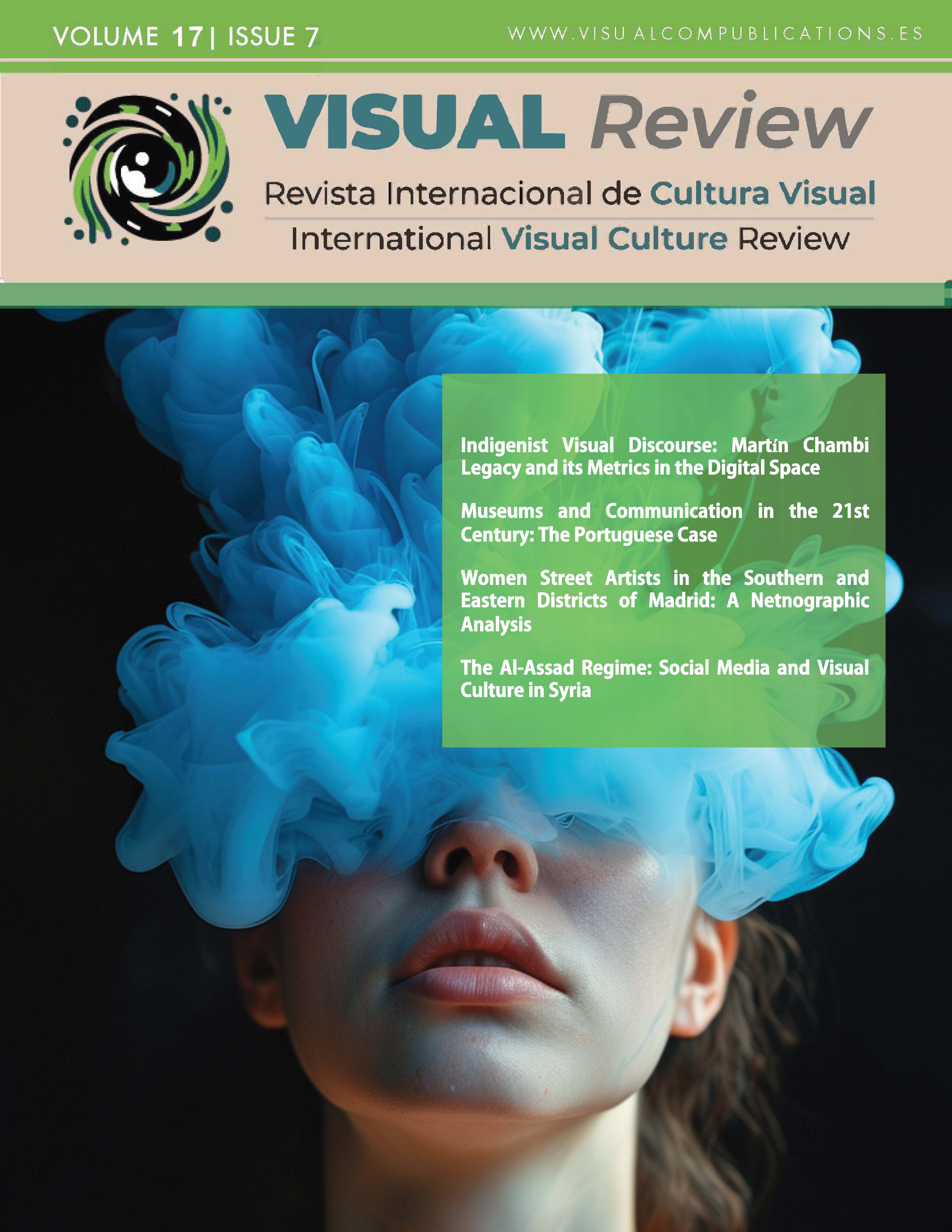Museums and Communication in the 21st Century
The Portuguese Case
DOI:
https://doi.org/10.62161/revvisual.v17.6064Keywords:
Museums, Communication, 21st Century, Museums in the history, Portugal, Internet, DemocracyAbstract
Bearing in mind the importance of communication for the museum, in our text we take a journey through museums from their foundation to the present day, and the relationship they have with the communication, both on the global stage and in the local Portuguese context. Since the eighteenth century, museums have emerged with the central function of communicating ideas, political ideas about communities and their respective social and cultural organizations. This trip ends with the challenges posed to today's museums from the point of view of the use of new means of communication such as the Internet or Smartphones. What are the communicative strategies of museums in an increasingly technological world? Will the use of these new means of communication, such as the Internet, eliminate physical visits to museums? Will virtual museums replace physical spaces? These will be the questions that we propose to answer in this text, using the Portuguese national museum framework as an example.
Downloads
Global Statistics ℹ️
|
236
Views
|
113
Downloads
|
|
349
Total
|
|
References
Almeida, A. (2006-2007). Contributos ao Estudo da Museologia Portuguesa no século XIX. Revista da Faculdade de Letras, Ciências e Técnicas do Património, V:(VI), 31- 55. https://ler.letras.up.pt/uploads/ficheiros/6617.pdf
Almeida, A. (2022). Comunicação nos Museus Portugueses no século XXI. [Master’s dissertation]. Repository of the University of Lisbon. https://repositorio.ulisboa.pt/jspui/bitstream/10451/57260/3/ulflafpmalmeida_tm.pdf
Almeida, M. (1996). MUDANÇAS SOCIAIS / MUDANÇAS MUSEAIS: Nova Museologia/Nova História - Que relação? Cadernos de Sociomuseologia, 5:(5), 99-118. https://revistas.ulusofona.pt/index.php/cadernosociomuseologia/article/view/254
Ballart, J. & Tresserras, J. (2005). Gestión del patrimonio cultural. Ariel Patrimonio.
Barry, A. (2006). Creating a Virtuous Circle between a Museum’s Online and Physical Spaces. Museums and the Web 2006. Proceedings. Albuquerque, New Mexico. http://www.museumsandtheweb.com/mw2006/papers/barry/barry.html
Brito, J. (2006). O museu, entre o que guarda e o que mostra. In A. Semedo e J. Teixeira Lopes. Museus, discursos e representações. Afrontamento.
Caetano, A. (1738). História Genealogica da Casa Real Portugueza: desde a sua origem até ao presente, com as Familias Illustres, que procedem dos Reyes, e dos Serenissimos Duques de Bragança. Tomo V. Oficina de JosephAntonio da Sylva, impressor da Academia Real. https://purl.pt/776
Carrilho, A. (2016). Os museus em Portugal durante a 1.ª República [Doctoral thesis]. Universidade de Évora. Electronic Thesis and Dissertation Repository. 17298. https://dspace.uevora.pt/rdpc/handle/10174/17298
DECLARAÇÃO DE CARACAS - ICOM, 1992. Cadernos De Sociomuseologia, 15:(15). https://revistas.ulusofona.pt/index.php/cadernosociomuseologia/article/view/345
lnternational Council of Museums (2007). “RESOLUTIONS ADOPTED BY ICOM’S 22ND GENERAL ASSEMBLY. https://icom.museum/en/
International Council of Museums - Nederland (2020). The museum definition: a fact sheet. https://icom.museum/en/
International Council of Museums (2024). Missions and objetives. https://icom.museum/en/
Kemp, K. (2024). INOVAÇÃO TECNOLÓGICA E COMUNICAÇÃO EM MUSEUS: Para além das exposições. Revista Concepção. 3:(1), 64-76. https://revistas.anchieta.br/index.php/RevistaConcepcao/article/view/241
Magalhães, F. (2003). Museologia, Ecomuseus e Turismo: Uma relação profícua? Antropológicas, 7, 211-224. http://revistas.rcaap.pt/antropologicas/article/view/871/678
Magalhães, F. (2016). A Praça do Império no Imaginário coletivo português: memória e narrativa nacional. In M. Salomé, C. Pisonero, B. Acuña (coord.), Experiências y manifestaciones culturales de vanguardia. McGraw-Hill.
Magalhães, F. (2019). Ameaças e oportunidades do Turismo no século XXI: musealização do Centro Histórico do Porto. In C. Sánchez-Palencia, P. Salas, L. Liñan (coord.), Trabajos sobre la Fenomenología Cultural. Ediciones Pirámide.
Marinetti, F. et. Al. (1909). Il Manifesti del futurism. Fígaro. https://comaarte.wordpress.com/
O Museu da Revolução inaugurado em 29 de dezembro (1911). O Occidente: Revista Illustrada de Portugal e do Extrangeiro, XXXIV:(1153), 1-8. https://hemerotecadigital.cm-lisboa.pt/
Princípios da política museológica (2004). Lei n.º 47/2004, de 19 de agosto. https://diariodarepublica.pt/dr/detalhe/lei/47-2004-480516
Ramos, P. (1993). Breve história do museu em Portugal. In M. Trindade (coord.). Iniciação à Museologia. Universidade Aberta.
Remelgado, A. (2014). Estratégias de Comunicação em Museus: Instrumentos de Gestão em Instituições Museológicas [Doctoral thesis]. Universidade do Porto. https://hdl.handle.net/10216/109315
Soares, D. (2020, april, 20). Museus fechados: visitas "online" cresceram até aos 500%. Rádio Renascença. https://rr.sapo.pt/
Simon, N. (2010). The Participatory Museum. Museum. https://www.google.com/search?udm=36&q=The+participatory+museum
Shore, C. (2005). Building Europe: The Cultural Politics of European Integration. Routledge.
Styliani, S. et. Al. (2009). Virtual museums, a survey and some issues for consideration. Journal of Cultural Heritage 10: (4), 520–528. https://doi.org/10.1016/j.culher.2009.03.003
Temudo, A. (2016). As coleções de arte dos museus nacionais em Portugal - The art collections of national museums in Portugal. Museologia e Patrimônio - Revista Eletrônica do Programa de Pós-Graduação em Museologia e Patrimônio, 9:(2), 180-195. http://revistamuseologiaepatrimonio.mast.br/index.php/ppgpmus/article/view/523
The Art Newspaper (2024, march, 24). Exclusive: international museum attendance figures back to pre-pandemic levels. https://www.theartnewspaper.com/
United Nations (2024). UNESCO: United Nations Educational, Scientific and Cultural Organization. https://www.un.org/
Downloads
Published
How to Cite
Issue
Section
License
Copyright (c) 2025 Authors retain copyright and transfer to the journal the right of first publication and publishing rights

This work is licensed under a Creative Commons Attribution-NoDerivatives 4.0 International License.
Those authors who publish in this journal accept the following terms:
-
Authors retain copyright.
-
Authors transfer to the journal the right of first publication. The journal also owns the publishing rights.
-
All published contents are governed by an Attribution-NoDerivatives 4.0 International License.
Access the informative version and legal text of the license. By virtue of this, third parties are allowed to use what is published as long as they mention the authorship of the work and the first publication in this journal. If you transform the material, you may not distribute the modified work. -
Authors may make other independent and additional contractual arrangements for non-exclusive distribution of the version of the article published in this journal (e.g., inclusion in an institutional repository or publication in a book) as long as they clearly indicate that the work was first published in this journal.
- Authors are allowed and recommended to publish their work on the Internet (for example on institutional and personal websites), following the publication of, and referencing the journal, as this could lead to constructive exchanges and a more extensive and quick circulation of published works (see The Effect of Open Access).














